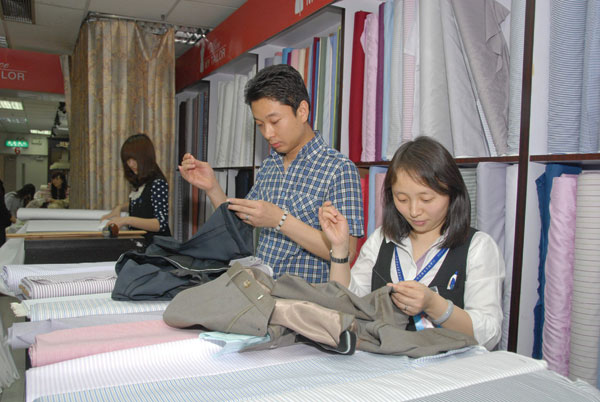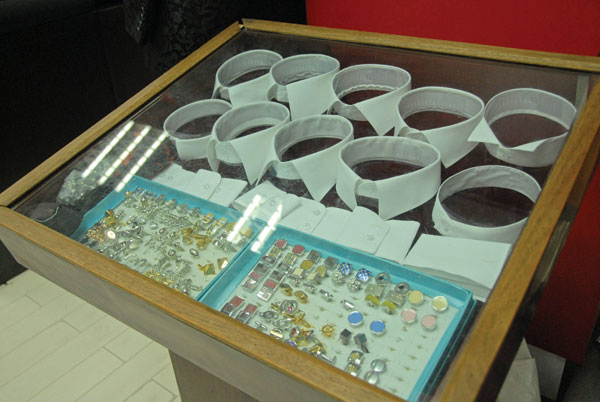Business is Sew=Sew
Updated: 2012-04-11 06:53
By Tiffany Tan (China Daily)
|
||||||||
|
 Alice Tailors at Beijing's Yashow Market. Photos by Geng Feifei / China Daily |
|
 Collars and cuff buttons on display at Alice Tailors. |
People are more likely to go to the mall than visit the tailor when shopping for clothes these days, so tailors have adapted to the new reality. Tiffany Tan reports in Beijing.
You can say that Cao Lu and Deng Ying are united by a common goal. A few times a year, the women visit Alice Tailors at Beijing's Yashow Market to have office clothes made for their husbands. Their spouses are bigger than average Chinese male and have difficulty fitting into ready-made clothes.
"He is very fat," Deng says bluntly. "Having clothes custom-made was an idea I had to come up with when I couldn't find stuff that fit my husband."
Cao says people are driven to the tailor's by both extremes in the size chart. "I have a friend whose husband is very thin, so she also has his clothes tailor-made. She was actually the one who suggested this solution to me."
During her visits to Yashow, Cao, 33, sometimes orders Chinese-style tops and skirts to wear on special occasions. Deng, 41, says she has been planning to get a cheongsam made but hasn't gotten around to it yet.
Times have indeed changed. Until the late 1980s, Cao and Deng and their families made a beeline for tailoring shops whenever they needed new clothes. They rarely went to clothing shops; if they did, it was for special purchases, like coats and outfits for Spring Festival.
"At the time shopping malls did not carry many of the latest trends," says Deng, who grew up in Jingzhou, Hubei province.
The challenge today, she says, is not to "go overboard" buying the latest fashion off the rack.
The landscape of Chinese tailoring shops has changed rapidly with the country's economic and social development in the past three decades.
For one, garment manufacturing boomed following the economic reforms of 1979. China now has 50,000 "volume" garment factories, which have an annual turnover of 1 trillion yuan ($158.5 billion) or 2 percent of GDP, according to data provided by business media company Global Sources.
Last year, Chinese factories produced 25.42 billion articles of clothing - more than a third, or 9.1 billion pieces, of which were sold domestically. On top of this is the influx of imported garments. Such a massive supply has made ready-to-wear clothes much more accessible, and often more affordable, than custom-made ones.
Fang Jian, a Shanghai IT engineer, couldn't agree more.
"If I have clothes made at the tailor's, I first need to buy the fabric, get measured and wait days for the item to be finished," says the 28-year-old, who grew up on clothes from his neighborhood tailoring shops in Wuyi, Zhejiang province.
"If I go to the mall, I can immediately get what I want and also have different styles to choose from." The last time Fang remembers visiting a tailoring shop was back in 1997.
The shift in society's mindset since China's reform and opening up in 1979 is another factor tilting the scale toward constantly evolving, store-bought fashion.
"People, once closed-minded, have gradually become more pragmatic, flexible and innovative," Liu Juan, an associate professor at Beijing Institute of Fashion Technology, says.
"Their cultural outlook has gone from being politicized and resistant to Western or foreign influences to being confident, open and tolerant."
At the same time, the population has become increasingly consumerist. This has created huge demands in quantity that "small-scale, family-run" tailoring shops can no longer meet, Liu says.
The decline in tailoring shops became evident in the late '90s, she says, just as China's garment manufacturing picked up speed.
The tailoring shops that have survived - most of them in major cities like Beijing and Shanghai - know they're now catering to a niche market and have evolved with the times.
Shi Yongxia, a third-generation tailor from Longcun, Anhui province, owns a shop on Yandai Xijie, a stone's throw from Beijing's Houhai bar and restaurant area. She started the business with her husband in 2000, years after working at Ruifuxiang, China's longest-running tailoring company, founded in 1893.
When she started sewing in the mid '80s, Shi says people went to the tailor's for simple, everyday clothes. Because of changes in demand, Shi, 47, now specializes in traditional clothing, such as cheongsams, Tang Dynasty-style tops and Chinese suits.
"(Customers) think clothes from the olden days are really interesting and are infused with culture," she says, adding that her clothes are usually worn to weddings, Spring Festival celebrations and events overseas.
In 2008, with e-commerce booming on the mainland, Shi opened an online shop. But at any given time, her brick-and-mortar shop also offers dozens of ready-made clothes, since a fifth of her sales now come from off-the-rack buys. Her foreign clientele, though not as big as those of shops in Yashow market, is also growing.
The shop is doing so well that Shi imagines passing it on to her 25-year-old daughter, who, like her, has a special talent with cloth and thread.
"Her work is really good," Shi says. "She can definitely make this business grow."
Contact the writer at tiffany@chinadaily.com.cn.

 Relief reaches isolated village
Relief reaches isolated village
 Rainfall poses new threats to quake-hit region
Rainfall poses new threats to quake-hit region
 Funerals begin for Boston bombing victims
Funerals begin for Boston bombing victims
 Quake takeaway from China's Air Force
Quake takeaway from China's Air Force
 Obama celebrates young inventors at science fair
Obama celebrates young inventors at science fair
 Earth Day marked around the world
Earth Day marked around the world
 Volunteer team helping students find sense of normalcy
Volunteer team helping students find sense of normalcy
 Ethnic groups quick to join rescue efforts
Ethnic groups quick to join rescue efforts
Most Viewed
Editor's Picks

|

|

|

|

|

|
Today's Top News
Health new priority for quake zone
Xi meets US top military officer
Japan's boats driven out of Diaoyu
China mulls online shopping legislation
Bird flu death toll rises to 22
Putin appoints new ambassador to China
Japanese ships blocked from Diaoyu Islands
Inspired by Guan, more Chinese pick up golf
US Weekly

|

|






